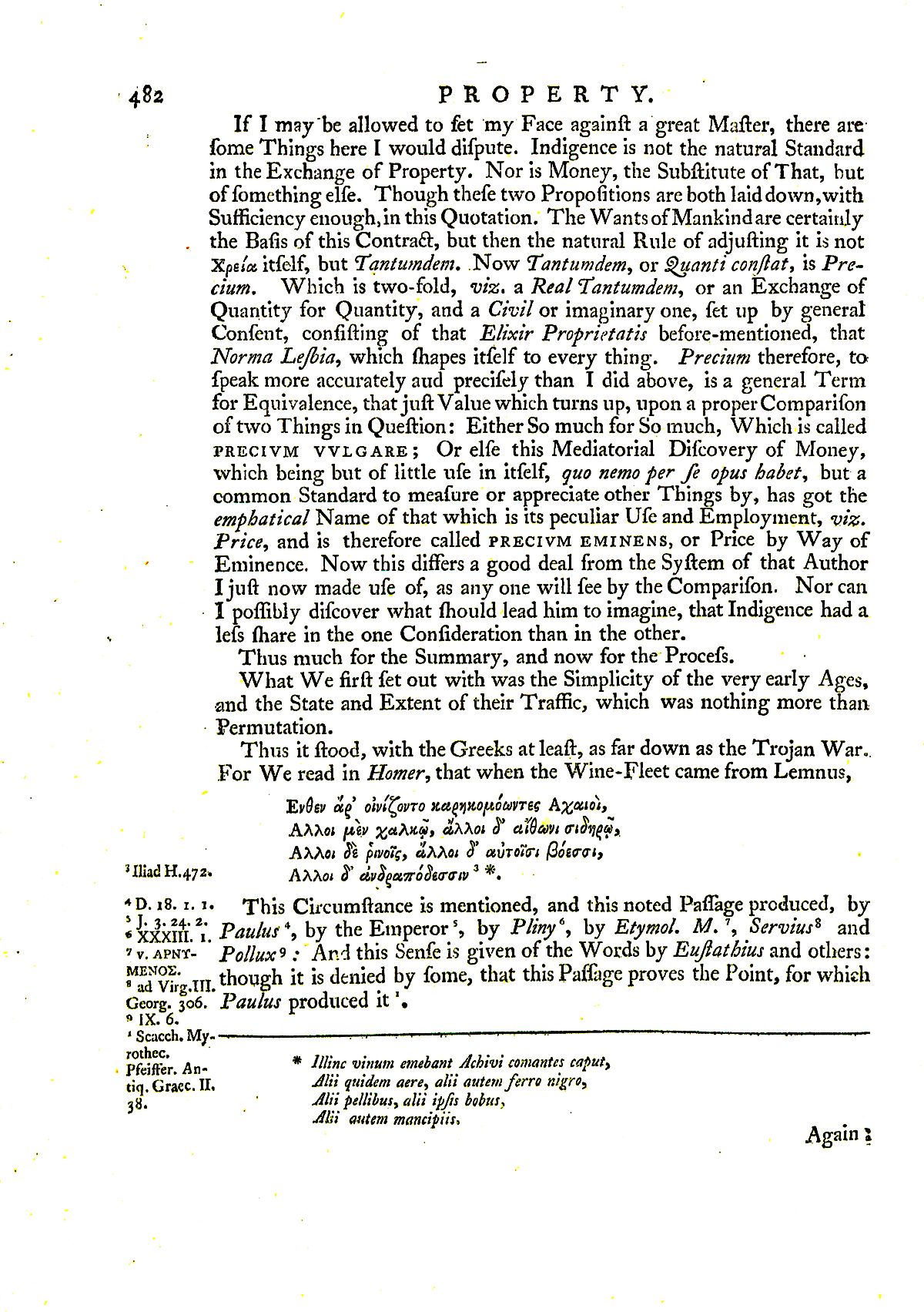Difference between revisions of "Love against Donelson"
| Line 18: | Line 18: | ||
|desc=8vo (21 cm.) | |desc=8vo (21 cm.) | ||
}} | }} | ||
| − | ''Love, against Donelson and Hodgson'' is a published decision | + | ''Love, against Donelson and Hodgson'' is a published decision by [[George Wythe]], for the case [[Love v. Donelson]] in Virginia's High Court of Chancery.<ref>George Wythe, ''[[Media:WytheLoveAgainstDonelson1801.pdf|Love, against Donelson and Hodgson]]'' (Richmond, VA: Thomas Nicolson, 1801?).</ref> It was published in pamphlet form in 1801 or later, probably printed by Thomas Nicholson of Richmond, Virginia, who also published [[Decisions of Cases in Virginia by the High Court of Chancery|Wythe's Reports]] in 1795, and several other pamphlets for Wythe in 1796, and later.<ref>Wythe states that the case took place in the "first year of the nineteenth centurie"; it is the opinion of the editors that the Chancellor would have understood that the new century began in the year 1801, and therefore the pamphlet must have been published sometime between then and the year of Wythe's death, in 1806.</ref> |
==Evidence for Inclusion in Wythe's Library== | ==Evidence for Inclusion in Wythe's Library== | ||
| − | After his death, Wythe's personal copy was [[Last Will and Testament|bequeathed with his books]] to [[Thomas Jefferson]], and subsequently became part of the Library of Congress. Several pages of this copy contain manuscript corrections by Wythe in his hand, including a footnote in Greek, apparently scraped off and corrected to 'Κάλχας Θεστορίδης οἰωνοπόλων': "[[wikipedia:Calchas|Calchas]] son of Thestor, far the best of augurs" (bird-diviners).<ref>Homer, [http://www.perseus.tufts.edu/hopper/text?doc=Perseus%3Atext%3A1999.01.0133%3Abook%3D1%3Acard%3D68 ''Iliad'' 1.69.]</ref> | + | After his death, Wythe's personal copy was [[Last Will and Testament|bequeathed with his books]] to [[Thomas Jefferson]], and subsequently became part of the collection at the Library of Congress. Several pages of this copy contain manuscript corrections by Wythe in his hand, including a footnote in Greek, apparently scraped off and corrected to 'Κάλχας Θεστορίδης οἰωνοπόλων': "[[wikipedia:Calchas|Calchas]] son of Thestor, far the best of augurs" (bird-diviners).<ref>Calchas was the prophet of Troy. Homer, [http://www.perseus.tufts.edu/hopper/text?doc=Perseus%3Atext%3A1999.01.0133%3Abook%3D1%3Acard%3D68 ''Iliad'' 1.69.]</ref> |
<gallery widths=300px heights=500px perrow=3> | <gallery widths=300px heights=500px perrow=3> | ||
Revision as of 15:10, 19 March 2015
by George Wythe
| Love against Donelson | ||
|
at the College of William & Mary. |
||
| Author | George Wythe | |
| Published | n.p. (Richmond, VA?): n.p. (Thomas Nicolson?) | |
| Date | n.d. (1801?) | |
| Language | English | |
| Pages | 34 | |
| Desc. | 8vo (21 cm.) | |
Love, against Donelson and Hodgson is a published decision by George Wythe, for the case Love v. Donelson in Virginia's High Court of Chancery.[1] It was published in pamphlet form in 1801 or later, probably printed by Thomas Nicholson of Richmond, Virginia, who also published Wythe's Reports in 1795, and several other pamphlets for Wythe in 1796, and later.[2]
Evidence for Inclusion in Wythe's Library
After his death, Wythe's personal copy was bequeathed with his books to Thomas Jefferson, and subsequently became part of the collection at the Library of Congress. Several pages of this copy contain manuscript corrections by Wythe in his hand, including a footnote in Greek, apparently scraped off and corrected to 'Κάλχας Θεστορίδης οἰωνοπόλων': "Calchas son of Thestor, far the best of augurs" (bird-diviners).[3]
- LoveAgainstDonelsonAndHodgson1800P1.jpg
Page one from Wythe's pamphlet, "Love, Against Donelson and Hodgson" (1801?). Copy at the Library of Congress.
- LoveAgainstDonelsonAndHodgson1800P13.jpg
Page 13 from Wythe's pamphlet, "Love, Against Donelson and Hodgson" (1801?). Copy at the Library of Congress.
- LoveAgainstDonelsonAndHodgson1800P14.jpg
Page 14 from Wythe's pamphlet, "Love, Against Donelson and Hodgson" (1801?), with Wythe's correction for the footnote: Κάλχας Θεστορίδης οἰωνοπόλων. Copy at the Library of Congress.
- LoveAgainstDonelsonAndHodgson1800P32.jpg
Page 32 from Wythe's pamphlet, "Love, Against Donelson and Hodgson" (1801?). Copy at the Library of Congress.
Page 482 of the third edition of John Taylor's Elements of the Civil Law (London: Charles Bathurst, 1769), with Wythe's reference to the "Norma Lesbia, which shapes itself to every thing."
References
- Jump up ↑ George Wythe, Love, against Donelson and Hodgson (Richmond, VA: Thomas Nicolson, 1801?).
- Jump up ↑ Wythe states that the case took place in the "first year of the nineteenth centurie"; it is the opinion of the editors that the Chancellor would have understood that the new century began in the year 1801, and therefore the pamphlet must have been published sometime between then and the year of Wythe's death, in 1806.
- Jump up ↑ Calchas was the prophet of Troy. Homer, Iliad 1.69.
See also
- American Bibliography
- Between Fowler and Saunders
- Between Wilkins and Taylor
- Between Yates and Salle
- The Case of Overtons Mill: Prolegomena
- Case upon the Statute for Distribution (pamphlet)
- Report of the Case between Aylett and Aylett
- Report of the Case between Field and Harrison

